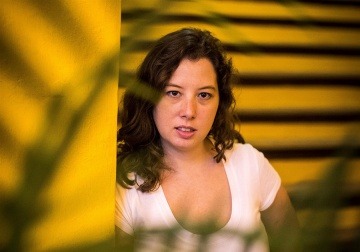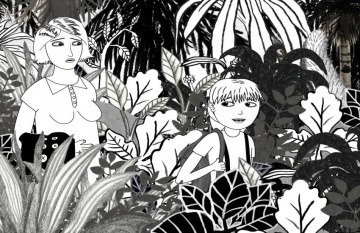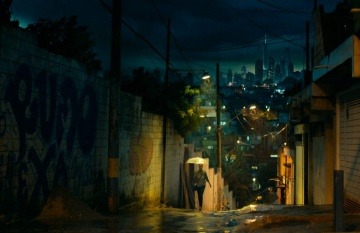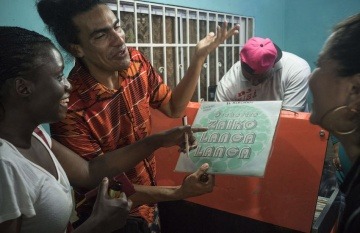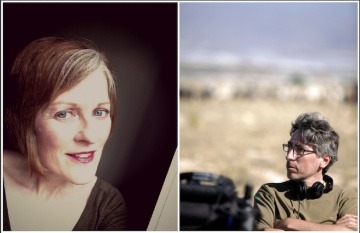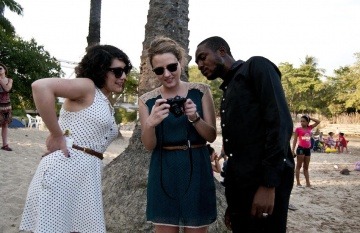*Photo: Joaquín Sarmiento/FNPI.
The FNPI -Gabriel García Márquez New Journalism Foundation, the Ministry of Culture of Colombia, and Cartago Foundation announce the Gabriel García Márquez Fellowship in Cultural Journalism to be held in Cartagena, Colombia, from Wednesday February 28 to Tuesday, March 6, 2018. Meet the winners.
» Description
“Film is an art form but also an industry, and if it is not for the masses, it is not profitable.” With these words, printed in a 1991 interview with El Tiempo, Gabriel García Márquez expressed his interest in the world of cinema beyond the stories told on the silver screen. His promotion of a dynamic industry was evident in the various roles he played—critic, reporter, screenwriter, editor, actor, and director—and the initiatives to promote cinema that he encouraged throughout Latin America.
The Fellowship 2018 will bring together fifteen journalists from around the world during the 58th Cartagena Film Festival (FICCI) with the aim of delving deeply into the craft of cultural journalism. During the course of the Film Festival, the Fellows will view films and meet directors, actors, and producers from around the world. They will share experiences with their colleagues, and above all, will have an opportunity to write under the guidance of four international masters.
The Fellowship will also encourage the fifteen participants to reflect on a cultural sector that is changing massively with the advent of platforms such as Netflix that have changed the methods of traditional consumption. It will also give the opportunity to analyze the new legal frameworks that countries are developing to favor or hinder various channels through an increase of the tax burden levied on entertainment products.
The sixth edition of the García Márquez Fellowship is possible thanks to the support of FICCI and the Spanish Agency for International Development Cooperation’s Training Center in Cartagena.
Gabo and the movies
Gabo’s relationship to cinema went far beyond the adaptation of his novels to the silver screen. One of his first approaches to film was as a critic with a column in El Espectador called El cine en Bogotá: Los estrenos de la semana in which he tried to promote quality films and support exhibitors that wanted to finance them but found it difficult.
At the age of twenty-eight, as a reporter for El Espectador, he journeyed to Rome and while there studied film direction at the Centro sperimentale di cinematografia. From Rome, he published writings such as La guerra de las medidas, a three-piece series on the rivalry between Sophia Loren and Gina Lollobrigida.
Years later, he also led workshops on screenwriting and created the New Latin American Cinema Foundation in Havana, Cuba. The purpose of the school was to contribute to the development and integration of Latin American cinema and achieve a common audiovisual universe, in addition to contributing to rescuing and strengthening the cultural identities of Latin America and the Caribbean.
This shows that Gabo, in addition to being a journalist who covered topics related to film, also played a significant role as screenwriter, director, and editor. He had a deep understanding of the inner workings of the world of film, not only as entertainment, but as a craft and a cultural industry.
» Fellowship Directors—Masters
Héctor Feliciano (Puerto Rico)
He has been a cultural correspondent in Europe for the North American newspapers The Washington Post and The Los Angeles Times. He has also published in Le Monde, Clarín, Etiqueta Negra, El Malpensante, and Letras Libres. In Paris, he worked as editor-in-chief of World Media Network, a consortium of European newspapers. He also worked as artistic director of the Paris Office of Cultural Affairs.
His book El museo desaparecido, about the Nazi conspiracy to steal masterworks of world art, is the result of extensive journalistic research, for which Columbia University in New York granted him the prestigious National Arts Journalism Fellowship (NAJP). In addition, he has participated in designing the new program of study for Columbia’s Graduate School of Journalism. Feliciano has a degree in history and art history from Brandeis University, a masters in journalism from Columbia University, and a doctoral diploma in comparative literature from the University of Paris.
Jonathan Levi (United States)
After graduating from Yale, Jonathan Levi was awarded the Mellon Fellowship to study at Cambridge University, where in 1979 he co-founded and later edited the literary magazine Granta, which according to The Daily Telegraph was “the most remarkable magazine of its time”.
Since leaving Granta, Levi has divided his time between writing and production. He is the author of the novels A Guide for the Perplexed and, most recently, Septimania. Levi’s short stories and articles have been published in Granta, Condé Nast Traveler, GQ, Terra Nova, The Nation, and The New York Times, and his plays and opera libretti have been performed around the world. Levi currently lives in New York and Rome, from which he writes about the arts and travel for The International New York Times and Condé Nast Traveler. He also directs workshops for Under the Volcano in Tepoztlán, México, and In Vino Veritas in Italy.
» Guest lecturers
Stephanie Zacharek (United States)
Film critic for Time magazine. Formerly a critic at Village Voice and Salon.com, she has produced cultural journalism for The New York Times, New York Magazine, The Los Angeles Times, Rolling Stone, and Sight and Sound.
She is a member of the New York Film Critics Circle and the National Society of Film Critics. In 2015, she was a finalist for the Pulitzer Prize for Criticism. The jury selected her work for combining the pleasure of intellectual exuberance, the perspective of experience and the transporting power of good writing.
David Trueba (Spain)
He studied journalism and has written numerous movies, among them Los peores años de nuestra vida, La niña de tus ojos, and Balseros, the only Spanish documentary nominated for an Oscar. He co-directed the television show El peor programa de la semana and created the series ¿Qué fue de Jorge Sanz?.
He has directed films La buena vida, Obra Maestra, Soldados de Salamina, Bienvenido a casa, La silla de Fernando, and Madrid, 1987. His latest film to be released came out in 2013, Vivir es fácil con los ojos cerrados, which received six Goya awards, among them Best Film, Best Director, and Best Script. In 2018, his film Casi 40 will premiere, starring Lucía Jiménez and Fernando Ramallo.
He has published five novels, all of them with with Anagrama: Abierto toda la noche (1995), Cuatro Amigos (1999), and Saber Perder (2008)—National Critics’ Award for Best Novel in Spain, the French translation a finalist for the Prix Médicis—Blitz (2015), and Tierra de Campos, one of the great successes of 2017.
» The Gabriel García Márquez Fellowship
In 2012, inspired by Gabriel García Márquez’s bond with the Caribbean, the cultural universe that fueled his literary and journalistic work, FNPI (created by García Márquez himself in the city of Cartagena), the Colombian Ministry of Culture, and Cartago Foundation established an international program to provide training and stimulus for journalistic creation, allowing journalists from five continents to share experiences and strengthen their abilities in the field of cultural journalism.
» How the fellowship works
Journalists participating in the Gabriel García Márquez Cultural Journalism Fellowship will cover the 58th Cartagena Film Festival (FICCI) and will develop their stories in workshops and personalized writing clinics. Personalities from the local cultural milieu will also participate in the sessions and meet informally with the fellows. The workshop will be directed by longtime FNPI professors Héctor Feliciano (Puerto Rico) and Jonathan Levi (United States), with the participation of international guests David Trueba (Spain) and Stephanie Zacharek (United States).
Fifteen journalists from around the world will be chosen to produce two works of journalism over the six days of the fellowship. One of them should be a work of film criticism, that the journalists will have committed to publishing.
The sessions will be held mainly in English, and therefore it is a requirement that participants have a good command of this language. When the sessions are conducted in Spanish, there will be simultaneous interpretation. The texts can be written in either Spanish or English.
» Participants
Fifteen journalists with experience covering cultural affairs, preferably cinema, with proficiency in English, with at least three years of experience, and who work for or publish in print or digital media will be selected.
Five places will be offered to Colombian journalists, five to Latin Americans, and five to journalists from other countries.
IMPORTANT: Each of the journalists selected to participate in the fellowship should consult with their national authorities to inquire as to whether they require a visa or other documents to enter Colombia. We recommend allowing sufficient time for this consultation as the paperwork may take several days.
» Requirements
Applicants must complete the registration form through the FNPI platform and attach:
● A narrative autobiography of up to 800 words in English, Spanish, or Portuguese, emphasizing the applicant’s experience in journalism in cultural fields and outlining their reasons for applying and expectations regarding participation in the fellowship.
● A letter of reference issued by a media outlet that certifies the journalist’s employment. If the journalist is not employed, the letter should indicate that the applicant has been published there at least once in the course of the previous six months. In either case, the letter must specify that the media outlet commits to publish the work produced during the fellowship, so long as it complies with its editorial policies.
● A long-form piece or profile, preferably in the field of cultural affairs, that has been published in the last twelve months. This work can be sent as a PDF of the original publication or can be entered into the registration platform as a link to its online location.
● A telephone or Skype interview will be held with a group of pre-selected applicants, previously notified, to verify their proficiency in English.
IMPORTANT: Only online applications submitted through the FNPI website form by January 11, 2018 11:59 p.m. (Colombian time) will be valid. (Si prefieres postular en español da clic aquí).
» Registration and support for the participants
Participants’ registration fee will be waived. Thanks to the support of the Ministry of Culture of Colombia, the Cartago Foundation, and the Cartagena Chamber of Commerce, the Gabriel García Márquez Fellowship will provide the following benefits:
● Accommodation for 8 nights in a single room with breakfast included
● Economy-class round-trip flights for participants
● International medical insurance for the days of the workshop
» How to apply
1. Click here.
2. Sign in with your email and password. If you do not have an account in www.archivo.fnpi.org you must complete the registration data on the following link: http://www.archivo.fnpi.org/registro/
3. Click on "Enroll".
4. Fill out the form displayed and attach the required documents mentioned in Requirements.
5. Click on "Send".
For more information or help, write to us at: dmarquinez@fnpi.org
